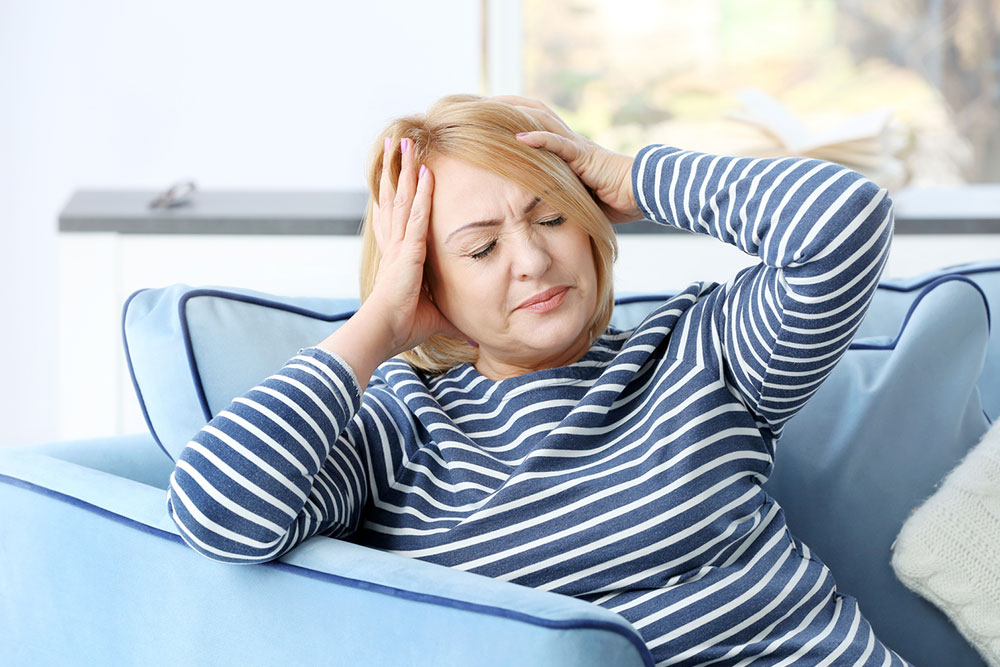Home Remedies For Headaches due to Migraines
The most common disorders of the nervous system are headaches—especially migraine headaches. Statistics show that nearly 15% of adults in the US experience severe headaches with an overwhelming majority of the people affected being women. One in four households has a person who is affected by a migraine.
Americans who were surveyed reported that their migraine symptoms lasted between one to three days. It runs within the family genes and 90% of the migraineurs have a family history of the condition.
Migraines are not just a headache
- It is a neurological condition with distinct debilitating neurological symptoms.
- Throbbing recurrent pain usually on one side of the head but both sides can be involved.

A migraine as a disability
The World Health Organization has classified severe migraine headaches as comparable to disabling illnesses like dementia, psychosis, and quadriplegia.
Since it affects people largely in the age group of 18-55, the impact is on the productive years of a person’s life. 113 million workdays are lost due to a migraine and employers lose more than $13 billion annually.
This means that chronic migraineurs must spend between $8500-9500 and episodic migraineurs must spend at least $2000 annually on medication, treatments, and healthcare. This figure also takes indirect costs into account such as—lost wages, productivity, etc.
Treatments
Mild attacks can be addressed with OTC pain relievers like aspirin, ibuprofen, acetaminophen, etc. Drugs like triptans are used specifically as remedies for migraines. Ergotamine/Caffeine combinations are also effective. Medication to combat nausea can also be taken. Other drugs like glucocorticoids and opioids, barbiturates, and nasal sprays can provide relief, but they have their own side effects.
Preventive medications include cardiovascular drugs, antidepressants, anti-seizure medications, non-steroidal anti-inflammatory drugs, etc. New drugs are being researched and released.
Home remedies for migraine headaches
Most migraineurs have their own remedies for migraines and these include natural migraine relief remedies. This is because a migraine is a chronic condition that lasts for most of their adult lives.
Drugs provide temporary relief, but they also carry the risk of side-effects, dependency, gastrointestinal bleeding, ulcers, acidity, etc.
Let’s look at some of the most common home remedies for migraine headaches:
- Know your triggers
Most migraineurs can easily get a clear picture on what triggers an attack—certain foods, lack of sleep, certain wines, cheeses and chocolates, perfumes, loud music or noise, bright sunlight or flashing lights, etc. Once you have tagged your personal triggers, make a list of them and avoid those as much as possible, without getting obsessed, anxious, or repelled by them.
- Stay alert
Recognize the signs early. Migraineurs have their own individual signs and symptoms like stomach or sleep disorders, mood changes, muscular stiffness etc.
- Herbal Remedies
Soothing herbal teas like peppermint, ginger, willow-bark, clove, feverfew, chamomile can provide natural migraine relief—given that you’re not bothered by the odor that they emit.
- Essential oils
They can be applied to the skin or certain products can sometimes be consumed. Effective products include peppermint, rosemary, lavender, chamomile, eucalyptus. Again, using essential oils as home remedies for migraine headaches are effective only if the smell is not a migraine trigger.
- Acupressure
This provides a soothing effect and diverts the sensation of pain to the other areas of the body. The pressure points for a migraine are located in the palm of the hand and applying pressure can relieve nausea/vomiting. Acupuncture can also provide long-term relief if done the right way.
- Food-Related
Many headaches, including migraines , can be triggered by low sugar levels. Eat at regular intervals and ensure that you always have a steady supply of snacks while you’re traveling and working.
However, avoid common trigger foods like aged cheese, processed meats, monosodium glutamate (MSG), high caffeine-content beverages, spicy and citrusy foods, foods/beverages containing aspartame, etc. Dehydration is another common trigger. Make sure you sip water throughout the day, especially if you work in air-conditioned environments.
- Hot showers and ice packs
These provide quick pain relief and helps you to relax and sleep properly . Try hot showers while applying a cold pack at the back of your neck.
- Magnesium and nutritional supplements
Studies show that nutritional deficiencies may lie at the root cause of many headaches, including a migraine . Magnesium supplements can be beneficial if that is the case. Magnesium oil or tablets can arrest a headache that has already started.
- Yoga and exercise
Improvement of circulation, weight loss, flexibility, and relaxation are the benefits of yoga and regular exercise programs. Ensure that you don’t practice vigorous exercises while you’re in the midst of an attack. Fresh air and a gentle, relaxing walk in a park can provide great relief. Ensure that you wear sunglasses and carry an umbrella to avoid bright sunlight.
- Sleep
Lack of adequate sleep is a sure-fire trigger for migraines. However, when migraine attacks commence, you might find it difficult to fall asleep.
Sometimes, short bursts of sleep don’t provide relief. Ensure that you sleep in a dark room to reduce the visual disturbances, shut down your phone, and try to reduce ambient noises as much as possible.

